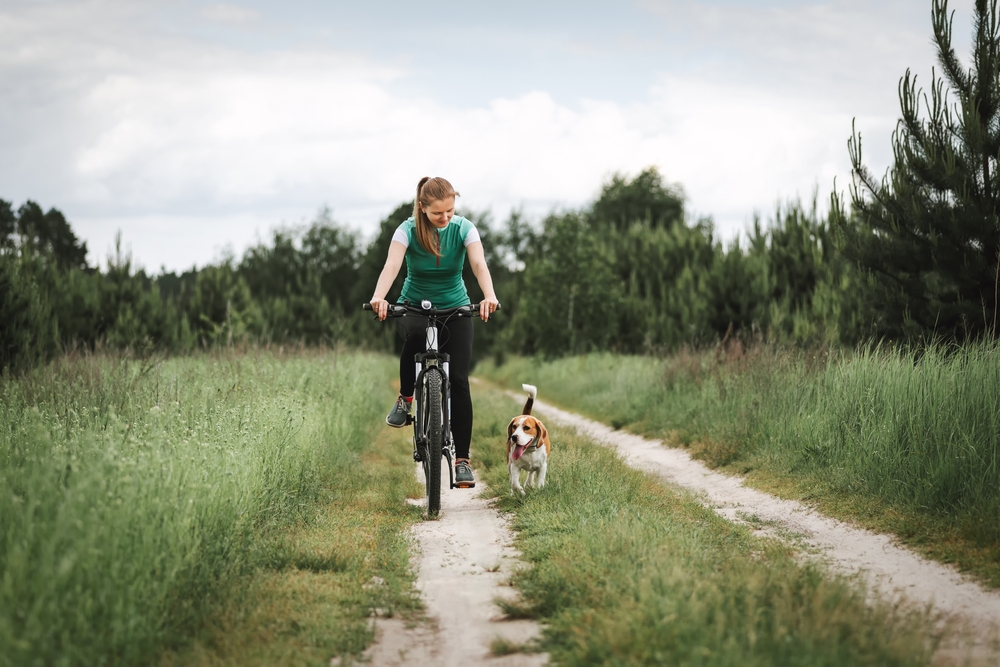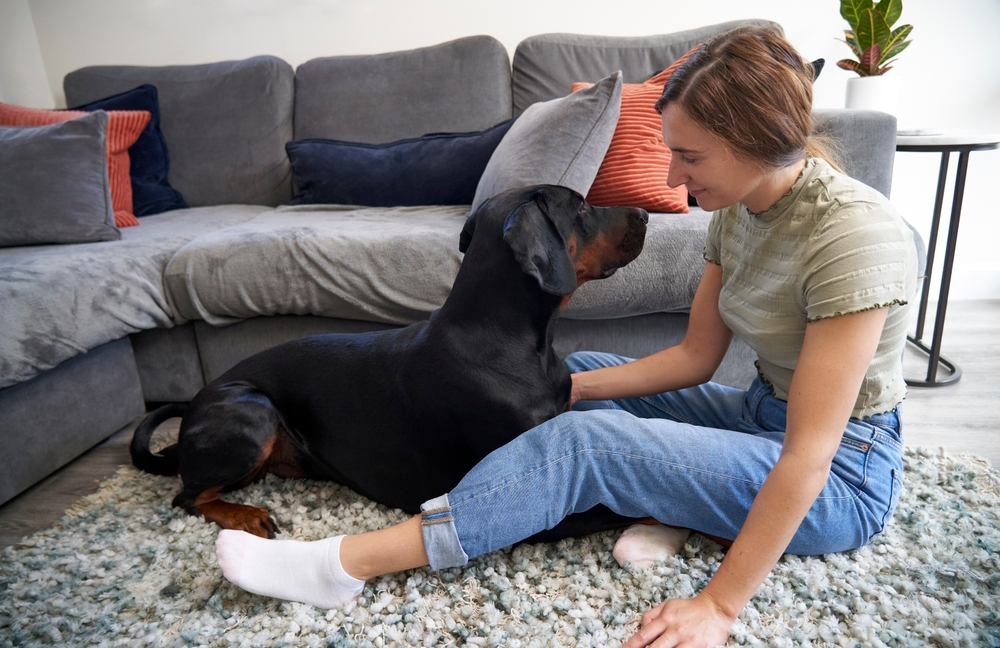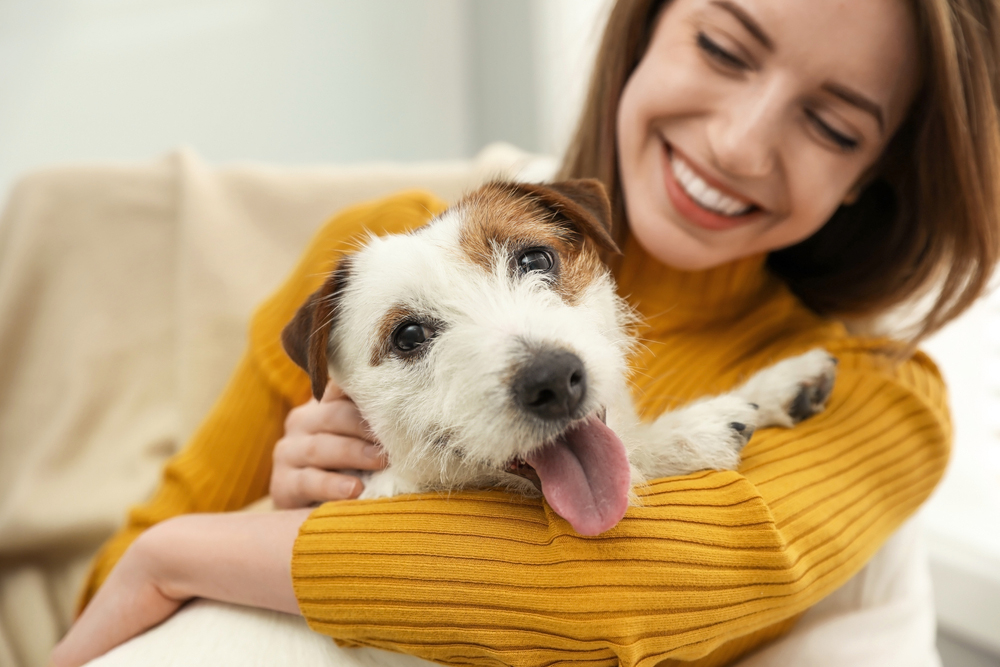Click to Skip Ahead
It is no secret that people with pets have an infinite love for the furry, scaly, or feathery creatures they share their home with. We love our dogs because of their sweet little faces, unwavering companionship, and the immeasurable joy they bring to our lives. But have you ever thought to yourself, “Why do I love my dog so much?” Today, we are going to take a deep dive into the scientific reasons we bond so beautifully with our canine counterparts. Read on to learn more.
The 6 Reasons Why We Love Dogs (According to Science)
1. Oxytocin
Oxytocin is a hormone in our bodies that promotes positive feelings. It’s involved in many different social bonds, like those between parents and their children and friendships. When we interact with our dogs in a positive way, both us and our beloved pets experience a surge in oxytocin. Some studies even suggest that merely just exchanging glances with your pup can raise both your and their oxytocin levels.1

2. Social Intelligence
Dogs possess human-like social skills, even greater than our nearest primate relatives. They’re highly tuned into our emotions and rely on their perception of our emotions to guide their behaviors. Our dogs can truly understand us and are very attentive and responsive to us and our feelings.
3. Similar Emotions
As different as we may seem as a species, dogs and humans do behave similarly in many ways. A dog that resource guards their food or favorite toy could be acting from a place of jealousy. Researchers found that dogs exhibit jealous behavior functionally similar to that observed in children.2 Other studies show that dogs can show empathy toward their owners when they are in distress and may even help rescue them.3

4. The Mere Exposure Effect
You’ve probably heard that some dogs look like their owners, but you may be shocked to learn that there actually is some truth to this phenomenon. Researchers have found, over and over, that there is a link between dog-owner physical resemblance, such as this study in Japan and this one from a psychologist in California.
One of the major reasons there is a dog-owner facial resemblance is due to the ‘mere exposure effect. This is the idea that we choose to get a pet that looks physically similar to us, as we, as humans, have a preference for things familiar to us.
5. Health Benefits
Dogs can make us physically and mentally healthier. Not only do they encourage us to be more physically active, but sociable as well. When we take our dogs to the park, it’s natural for us to start conversations with others, even if we don’t feel like it.

6. We Evolved Together
The connection between dogs and humans runs deep as the earliest signs of domestication go way back to 32,000 years ago. Though domesticated dogs didn’t really become unambiguous until 15,000 years later, this pairing suggests that we co-evolved. In fact, there may be no species that was so thoroughly integrated into our human society.
The fact that we evolved together is important when examining our love for dogs as we, at some point, started to develop in a way that allowed us to live together better. This symbiotic relationship formed while all humans were still nomadic hunters and gatherers, thousands of years before agriculture and civilization truly came on the scene. This suggests that many features of dogs weren’t shaped to match our modern environment but developed to match the nomadic conditions of our ancestors. In the beginning, dogs were given the bones from human hunts to eat after the people were done with them. In return, they provided us with a service that many still offer their humans to this day: the service of watchdog.
Do Dogs Love Us Back?
We know that our love for our pets runs deep, but is it reciprocated?
While anthropomorphizing animal behavior is generally frowned upon in science, some studies do seem to confirm the love our pets have for us.
As mentioned above, research shows that there is a hormonal bonding effect between humans and dogs. When our dogs gaze at us, the same hormonal response (oxytocin) that bonds us to our human infants is activated.
Another study shows that dogs will stick close to their human companions when put in uncertain environments with people unfamiliar to them.
A 2020 experiment found that when their humans pretended to be stuck in a box, their dogs exhibited signs of distress, whining, and pawing at the box to help release them.


Final Thoughts
While it’s nice to know there are scientific studies that prove why we love our dogs (and that they love us back), when we really get down to it, we welcome these sweet, furry creatures into our homes for their companionship. Our dogs don’t judge, talk back, or lie to us—just the opposite, in fact. The relationships we form with our dogs are often the easiest ones to create and foster, and there’s no denying the benefits we both reap from this partnership.
Featured Image Credit: New Africa, Shutterstock












